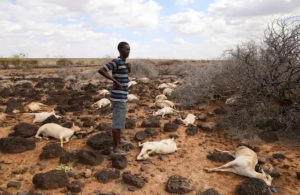[gravityform id=”1″ title=”false” description=”false” ajax=”true”]
Mashariki Television Networks Limited Email: info@themasharikinewspaper.com
Email Us
Our address
Mashariki Communications Centre
Meru-Maua Road
Main Telephone: +254 797 372 837
Postal Address: P. O. Box 747-60200, Meru, KenyaWe are social

By Gerald Kibaki
Ninety three goats and sheep belonging to two herders have died at the Dukana area in Dukana Ward, North Hor constituency, Marsabit county.
According to area chief Teyo Katello the animals, belonging to Bante Duba and Molu Duba drank water from a shallow well believed to be highly contaminated leading to their instant death.
The two herders; Bante Duba and Molu Duba, have called on local non-governmental organizations, the county, and the national government to help them in restocking.
“We depend on these animals for survival and we are still in shock as we stare at the carcasses before us. We cry to the two governments and NGOs to help us overcome this loss,” Duba said.
When animals consume high levels of contaminated water, they interfere with the blood’s ability to carry oxygen to the cells and the animals die from a sort of internal suffocation.
Elevated nitrate levels in drinking water are often caused by groundwater contamination from animal waste run-off and feedlots, use of fertilizers, or human sewage from public or private septic systems.
Katello said the government has initiated investigations after taking samples of the water to government chemists to know the exact chemical that killed the animals.
A similar incident happened in January 2019 in Maikona where at least 37 Camels died.
23 years ago, over 6500 animals died of Nitrate poisoning in Kargi and Laisamis.
In 2009, an inter-ministerial taskforce formed to investigate causes of sporadic livestock deaths in Marsabit recommended that locals living in desert areas should not consume surface water as water from the available shallow wells did not meet safety standards as residents petitioned the High Court through Kituo Cha Sheria in 2020 to compel the government to act urgently.
County Executive member for Agriculture, Livestock and Fisheries Hussein Ali ordered closer of the killer well awaiting further laboratory testing.
“We received the sad report and immediately dispatched our field officers with the directive to urgently close the water point and the samples to Nairobi for analysis,” he said.
The livestock department is also planning sensitization forums for the locals on the dangers of unused water points especially for the livestock.
According to Dr. Halkano Arero, Chief Officer for Livestock and Veterinary Services, areas such as El-Hadi, Sabare, Bales-Saru, and Dukana are at high risk of animals consuming contaminated water.
Dr. Arero said that based on the previous documentation, the department highly suspects a case of high nitrite content in the water bodies
He advised residents not to take their animals to any water point not in use for a long period of time to counter further deaths.

Comments (0)